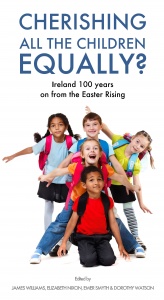Growing Up in Ireland project18 October 2016 | Admin
Growing Up in Ireland follows the fortunes of almost 20,000 children and their families over time. The main objectives of the study are to describe the lives of children, to establish what is typical and normal, as well as what is atypical and problematic. The study provides a very strong statistical evidence-base for researchers, policy-makers, practitioners and everyone with an interest in understanding all facets and dimensions of child development. Over recent years it has been increasingly used as an important input to the formation of effective and responsive policies and services for children and their families, not least in Better Outcomes, Brighter Futures (Department of Children and Youth Affairs, 2014). Growing Up in Ireland has two cohorts of children. The first is referred to as the Infant Cohort and is based on just over 11,100 children and their families. The families in this cohort were first interviewed between September 2008 and April 2009, when the Study Children were 9 months old, with a second interview taking place between December 2010 and June 2011, when they were aged 3. This cohort was further interviewed on an intensive face-to-face basis when the children were aged 5 and had just made the transition to primary school. At that time their school principal and teacher also played an immensely important role in the study by completing a number of questionnaires about themselves, their schools and, most importantly, about the Study Children whom they teach. More information was collected through postal questionnaires from the children’s main caregiver (mostly their mother) when the child was aged 7. The children and their families, school principal and teacher will be further interviewed on an intensive face-to-face basis when the children are aged 9, in 2017. The second cohort in the Growing Up in Ireland project is made of older children and young people, and is referred to as the Child Cohort. This is based on just over 8,500 children, their families and their teachers. Interviews first took place with the Child Cohort when the children were aged 9, with follow-up interviews when they were aged 13 and subsequently aged 17. It is planned to re-interview the young adults in this cohort in 2018 when they are aged 20. Growing Up in Ireland is the most ambitious and complex research project ever to have been undertaken in the social sciences in Ireland and signifies a major public investment in our children and young people. The project reflects the recognition by government of the importance of understanding the processes and interrelationships involved in child development and the influence that these have on the quality of life (immediate and long-term) for all children growing up in 21st century Ireland. The wealth of data from the Growing Up in Ireland study provides researchers, policy analysts and others with the information necessary to investigate the numerous interrelated dimensions of a child’s life, with a view to improving child outcomes and wellbeing. Growing Up in Ireland focuses on child outcomes in three main areas of their lives:
As discussed in detail in Greene et al. (2010b, p.13), the underlying conceptual framework adopted by Growing Up in Ireland emphasises the importance of the environments and contexts within which children live. This framework has evolved from the bioecological approach developed by, for example, Bronfenbrenner (1979, 2001) and Bronfenbrenner & Morris (2006). It sees the child’s world as consisting of a series of nested multi-layered systems, all of which exert an influence on the child’s development, to greater or lesser degrees. The family has the most immediate influence on the child. The school, neighbourhood and other contexts also directly influence the child and his / her outcomes. Equally, the relationships that the children themselves or their parents have outside the home (for example, in school or in the workplace) also affect the dynamic within the home and, ultimately, the child’s outcomes and wellbeing. At a somewhat higher level, the structures and institutions of society, as well as government policies and service provision also impact directly and indirectly on children – for example, through health, welfare or education policies. At the broadest macro-level, cultural ideologies, attitudes, beliefs and social mores also affect the growing child. Each of these systems and contexts, working independently of each other and in combination, all influence children and determine their experiences, wellbeing and ultimate outcomes – physical, cognitive and emotional. The Growing Up in Ireland project records a wealth of information that can be used to unpick the influences and interactions of these factors on the life of the child. The study allows cross-cutting analysis from one area of the child’s life to another. It facilitates, for example, a consideration of how characteristics and circumstances in the child’s family affect their educational outcomes, or how peer relationships may be associated with academic performance or engagement with school, or how children’s physical health may affect their socio-emotional wellbeing. Being longitudinal, the Growing Up in Ireland study also allows researchers and analysts to track changes over time, to assess the extent to which factors impact on the child at the micro-level as he / she develops and grows. In particular, it facilitates a consideration of how early life experiences are reflected in outcomes throughout the later life-course. Extracted from CHERISHING ALL THE CHILDREN EQUALLY? IRELAND 100 YEARS ON FROM THE EASTER RISING, edited by James Williams, Elizabeth Nixon, Emer Smyth and Dorothy Watson.
|
|
 Throughout the book we make extensive use of research and data that have emerged over recent years from the
Throughout the book we make extensive use of research and data that have emerged over recent years from the 